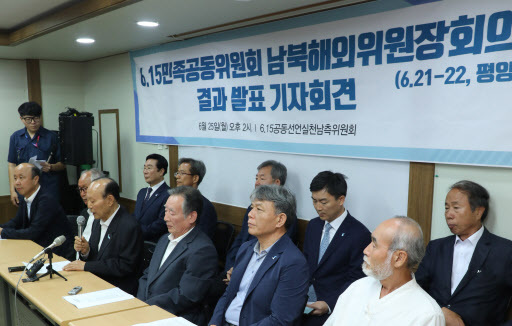Civic groups from the two Koreas agreed to boost private sector exchanges ranging from sports to culture in line with the joint declaration signed at the first inter-Korean summit in 2000, a South Korean civic group said Monday, after a rare four-day visit to Pyongyang last week.
The South Korean Committee on June 15 Joint Declaration visited Pyongyang from Wednesday to Saturday, which marks the first made by a civic group in nine years.
“The visit was meaningful because it marked the first time since a peaceful mood was formed through the inter-Korean summit and North Korea-US summit,” committee Chairman Lee Chang-bok said at a press conference in central Seoul on Monday.
 |
(Yonhap) |
Twenty South Koreans from the civic group, which was founded to implement the June 15 South-North Joint Declaration, met with eight North Korean counterparts, as well as four from the overseas committee, from Thursday to Friday in Pyongyang.
They arrived there by plane through Shenyang in northeast China on Wednesday upon the Unification Ministry’s approval. The ministry said it had rejected issuing permits for five other applicants from the civic group, comprehensively taking into account factors such as the “domestic environment” and “inter-Korean relations.”
During their meeting, they largely discussed ways to broaden inter-Korean exchanges between workers, students, women, athletes, farmers and municipalities, and hold joint events celebrating the 73rd anniversary of the Korean Peninsula’s liberation from Japanese colonial rule on Aug. 15, and the 11th anniversary of the inter-Korean summit in October 2007.
Upon the North Korean side’s suggestion, the civic groups agreed to inherit the spirit of the June 15 Declaration in implementing the Panmunjeom Declaration, signed between South Korean President Moon Jae-in and North Korean leader Kim Jong-un on April 27. They plan to revise their founding rules to add the implementation of the April 27 Declaration to their mission, and expand their organizations to better carry out the inter-Korean projects.
The confirmed inter-Korean event scheduled in the foreseeable future is a soccer game between workers from the Koreas, with the date yet to be settled.
One of the projects they agreed to carry out is to ask Japan to return the remains of Koreans coerced into labor in Japan during Japanese colonial rule, though they did not reveal any details.
With the majority of their plans for inter-Korean engagement requiring more consultation, the civic groups said they would continue to communicate through face-to-face working-level meetings and documents.
The groups also agreed to meet on a regular basis early every year to set the direction for their “unification movement,” they said.
The June 15 Declaration was signed at the first-ever inter-Korean summit held on June 15 in 2000 between South Korea’s former President Kim Dae-jung and then-North Korean leader Kim Jong-il.
The declaration marked the beginning of an unprecedented thaw on the Korean Peninsula since the 1950-53 Korean War and robust inter-Korean exchanges under the liberal administrations. The declaration was celebrated annually through jointly organized events until 2008.
Authorities from the two Koreas are also speeding up their talks to broaden inter-Korean exchanges to follow up on the April 27 agreement.
Also on Monday, Seoul’s Unification Ministry said it will hold working-level talks with North Korea to discuss ways to link and modernize cross-border rail ways on Tuesday on the border village of Panmunjeom. Separate talks on linking roads and cooperating on forestry will be held on Thursday and next Wednesday, respectively.
Last week, the officials from the Koreas agreed to make a joint entrance at this year’s Asian Games in Indonesia and hold the first inter-Korean basketball games in 15 years on July 3-6 in Pyongyang.
By Ock Hyun-ju (
laeticia.ock@heraldcorp.com)








